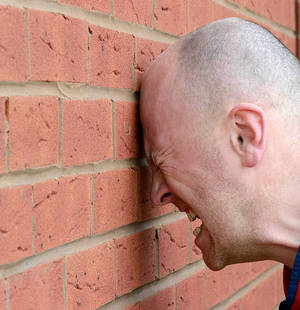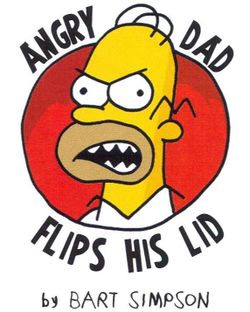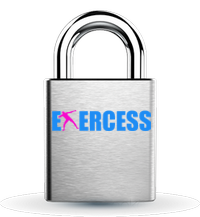Writer’s Block: The Wall That Isn’t a Wall
Almost everybody who’s ever written anything has hit the wall at some stage – i.e. come up against something that feels as solid as a bricks-and-mortar wall, and makes writing any further seem virtually impossible. And many have gone on to be very good writers. Why? Because that obstacle, writer’s block, is nothing more than a myth. It’s a made-up idea that conveniently lets us get away with not writing. And if you do actually want to write, then that’s a shame.
Do you actually want to write?
 If you’re hit with writer’s block, the first thing you need to do is check if you really are cut out to be a writer. Ask yourself this question, seriously. If you don’t feel the overwhelming desire, or the actual need to write, and if you don’t feel that you have at least a little talent for it, then don’t bother. Leave it to one side and just get on with something else. You don’t have to be a writer. You don’t have to agonise over it. Just do what’s right for you. And if that means not writing, that’s fine. You’ll feel much better for having made that decision.
If you’re hit with writer’s block, the first thing you need to do is check if you really are cut out to be a writer. Ask yourself this question, seriously. If you don’t feel the overwhelming desire, or the actual need to write, and if you don’t feel that you have at least a little talent for it, then don’t bother. Leave it to one side and just get on with something else. You don’t have to be a writer. You don’t have to agonise over it. Just do what’s right for you. And if that means not writing, that’s fine. You’ll feel much better for having made that decision.
If, however, you feel some inner compulsion to be a writer, then you have a duty to yourself to just get on with it. You’ll kick yourself years from now if you don’t. All those things you could have written … they’ll haunt you. And the way to get on with it is … well, whatever works for you, basically. But if you’re having trouble even starting, then my advice is to start to form a habit of writing so that it becomes easier and less of a mental performance, arguing with yourself, back and forth, about whether you can, whether you should, what to write about, and so on and so on.
Creating a writing habit
If I said you need to start writing every morning at 9 a.m. and not stop until noon, you’d be horrified. And rightly so. The thought of having to do that every day is frightening, and just the kind of thing that would make you put your pen down for good. Luckily, what I’m suggesting isn’t nearly so drastic.
Every day, at about the same time (maybe when you’ve finished checking your email in the morning), just open your chosen program or app, or your physical notebook, and start writing. And don’t stop … for at least five minutes. You could use an app for this, one that will sound an alarm or play a sound effect after a set period, for example. Or you could just use that old technology; look at the clock and mentally set an alarm for five minutes starting from the time you see staring back at you.
What do I write about?
 What you write is, of course, your own business; it doesn’t matter much, just as long as you write. Write about your plans for the day, if you like. Or list some of the things in your life that you’re grateful for. That should keep you busy for five minutes, at the very least (if it doesn’t, you’re really not appreciating life, and taking care of that problem should take precedence over the writing thing). Write about how you feel … either generally, or right at this moment. Or, maybe more importantly, how you would like to feel. Write about an incident in your life, if you feel like, maybe something that happened in your childhood. The list of possibilities is endless, it really is. You can write about literally anything, real or imagined.
What you write is, of course, your own business; it doesn’t matter much, just as long as you write. Write about your plans for the day, if you like. Or list some of the things in your life that you’re grateful for. That should keep you busy for five minutes, at the very least (if it doesn’t, you’re really not appreciating life, and taking care of that problem should take precedence over the writing thing). Write about how you feel … either generally, or right at this moment. Or, maybe more importantly, how you would like to feel. Write about an incident in your life, if you feel like, maybe something that happened in your childhood. The list of possibilities is endless, it really is. You can write about literally anything, real or imagined.
A few ideas
Here’s an interesting idea: imagine you’re in a creative writing class and the instructor has just given you an assignment. Here it is (and by the way, it could be anything at all, this is just an idea):
ASSIGNMENT: You’ve just woken up and you can’t remember who you are. You find that you’re in a hotel room, and when you enquire at the desk you find that you signed in the night before under a name you don’t recognise (an assumed name? your own name?) You have a bit of money in your pocket, but no ID. And you really don’t remember how you came to be here. What do you do next? Where might this lead? Did you do something illegal? Is your amnesia due to an accident of some sort? Have you checked if you’re injured? or maybe the cause is an illness? Do you even know what city you’re in? What are you going to do?
That’s it … take it from there. Write as though this is a new chapter in a book that’s well underway (that way you don’t have to worry about filling in the protagonist’s back story). Don’t bother yourself about how it will mesh with the other chapters (they don’t even exist!), just feel free to write, and write anything that comes into your head.
This should be easy. Take a situation like this and run with it. If you can’t write on this for at least five minutes, then you probably shouldn’t bother with writing at all. That’s not a problem. In fact, it’s a solution; if you see that writing’s really not for you then you’re free to get on with life and stop struggling with the idea of being a writer.
Another approach
If you want to start with something else, try this: start writing about a new invention you’ve come up with (don’t panic, it’s a totally fictitious one, it doesn’t have to be scientifically feasible). Describe how this wonderful invention will make life easier, how it will help solve the world’s energy problem, how it will help in cleaning up the environment, how it will make you rich, or whatever.
Or how about this: you’ve just received a hand-written letter (unusual in itself, these days), and it’s from someone who obviously knows you pretty well, although you don’t know them (or at least you aren’t aware who it’s from, if it is from someone you know). It starts off fairly chatty and amiable, and then, like a criminal circling his victim, it starts to become a bit vaguely threatening. Now you’re feeling edgy. You’re starting to get a bit worried. It’s mentioning things from your past that you thought nobody knew about, nobody at all. The skeletons in your cupboard are starting to well and truly rattle.
How are you going to deal with this? Is this going to be blackmail? Does somebody want you dead? Or exposed to the world for the fraud that you are? Would it be possible to find out who the letter writer is? Should you tell anyone about it? Who would you confide in? Surely that would be difficult anyway, considering the content of the letter. Build up the story from there, keeping it fairly simple (you’re aiming to write for five minutes, remember, maybe a bit longer, not planning a novel).
Or maybe sci-fi?
 Or how about delving into sci-fi? You’re on an interplanetary cruise ship and you’re halfway to a planet that’s been designated for colonisation. The ship is hit by a meteor storm and sustains extensive damage. Many of the crew are dead or unable to man their stations. For some reason (make one up, if you like) you’re voted to take charge. What happens next?
Or how about delving into sci-fi? You’re on an interplanetary cruise ship and you’re halfway to a planet that’s been designated for colonisation. The ship is hit by a meteor storm and sustains extensive damage. Many of the crew are dead or unable to man their stations. For some reason (make one up, if you like) you’re voted to take charge. What happens next?
Or something else … someone you know approaches you and claims to be from the future. You don’t believe him (or her?) until they prove, beyond doubt, that they know what’s going to be in the news in the next few days, and their predictions are eerily accurate. After this happens a few times you’re convinced. This person asks for your help – you’re the only one person in the world who can help, and it can mean saving a lot of lives, or maybe even changing the course of history (future history, that is). What happens next?
Create your own starting point
These are just a few simple openings. The list really and truly is endless. You could make it a point to spend a few of your early morning five-minute writing periods just listing simple openings, getting them from anywhere, from movies you’ve seen, books you’ve read, from things in the news, from your own life experiences … from anywhere and everywhere.
Each and every one of them will potentially make an interesting few minutes writing, and might even become the kernel of an idea for something bigger, should you want to develop it further. Keep the ideas and openings fairly brief and open-ended. Each one should be somewhere to start writing, that’s all. It doesn’t have to be the start of a novel, or even a short story. It’s just some kindling to spark your creativity and get you writing, if only for those valuable five minutes.
Is five minutes enough?
Once you’ve started to build a habit of writing for a few minutes every day, at about the same time, you’re over that hump. Just doing that should smash a sizable hole in the wall that writer’s block seems to to have constructed right in front of you.
And is five minutes enough? That’s for you to decide! If you feel like expanding the story, go for it. The five minutes isn’t meant to be a limit you can’t exceed, it’s just a milestone for you to reach. From there, you can go anywhere!
Build up this writing habit and see where it takes you. It doesn’t have to lead you into becoming a novelist, or any kind of published writer. It might just mean that you’re better prepared to keep a daily journal from now on, and feeling that you’ve actually got something to write in it. And feeling confident that you can actually write.
And isn’t that what this is all about? Feeling confident that you are a writer, whether that means you write to entertain others or just to get your ideas out and onto paper (or the screen).
Oh, and if you want to write a short story, here’s something to get you thinking (I think I read this online, can’t remember when or where):
A teacher sets the class an assignment. He tells them he wants each of them to write a short story, and to do it while keeping these guidelines in mind: it must include the issues of sex, violence, everyday language, mystery and religion, and it must be as short as possible.
 The winning story was something along these lines:
The winning story was something along these lines:
Daughter: “Hey dad, guess what … I’m pregnant!”
Father: “Holy Christ! Who’s the father?”
Daughter: “How the f**k should I know??”
Father: “Well, whoever it is, I’m gonna kill him!”
— The End —
You see, it’s amazing what you can convey in just a few carefully chosen words 😉
Don’t let writer’s block hijack your creativity
Whatever you do, don’t give in to writer’s block, just deal with it. Build a writing habit, and if all you ever do is write for five minutes each morning, at least you won’t be staring at a blank page or a blank document on your monitor from then on, worrying how or where to start.
But hey, don’t just take my word for it. Take a look at a writing expert, and see what he has to say on the matter. Stephen King is a writer virtually everybody has heard of, and most people have either read some of his work or seen some of the many screen adaptations of it. His output is phenomenal! And how does he do it? He writes one word at a time, same as you and me. No magic involved. Just a serious writing habit.
If you want to read about his methods, read On Writing, his book about, well, his writing. Or look up some interviews he’s given; there are plenty on YouTube. He’s been asked so many times about where he gets all these crazy ideas and how he manages to write so much, and On Writing kinda answers those questions.
Even Stephen King had to develop a writing habit!
 Seems he writes every day. Yes. Every. Single. Day. There, that’s a big part of the secret of his success. Who’d a thunk it, huh?
Seems he writes every day. Yes. Every. Single. Day. There, that’s a big part of the secret of his success. Who’d a thunk it, huh?
And he reads every day. Yes. Every. Single. Day. It’s one of his lifelong habits. Because you can’t improve your writing without regularly dipping into the general consciousness that is encapsulated in writing. And those who know him say that if you mention something in conversation with him, he can take that and expound on it, and in great detail. In other words, he’s very knowledgeable about virtually everything. In fact, his knowledge of things in general (yes, not just horror story topics!) is astonishingly wide-ranging.
Have these habits (spending time reading and writing every single day) made him a recluse, or someone with very limited areas of interest? Re-read that last paragraph; he is amazingly well-read and leads a very full and varied life, including playing guitar for a rock band called Rock Bottom Remainders, a band comprised mainly of authors.

Sorry ... MEMBERS ONLY!
UNLOCK FOR FULL EXERCESS!EXERCESS is an online community of people who want to seriously improve their health and fitness, both mental and physical.
JOIN FREE TODAY!
… and get complete and unfettered access to an absolute goldmine of valuable information.
Already a member? Sign in!
